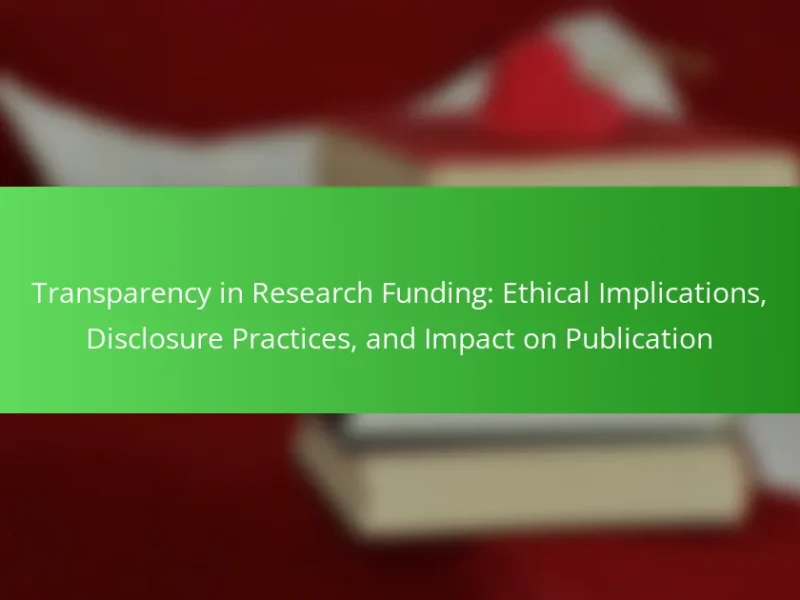Ethical Review Boards (ERBs) are committees tasked with reviewing research proposals to ensure adherence to ethical standards, particularly in studies involving human subjects. They assess potential risks and benefits, protect participants’ rights and welfare, and ensure informed consent is obtained. ERBs play a critical role in maintaining the integrity of research practices by evaluating scientific validity and monitoring compliance with ethical guidelines. Their influence extends to funding and publication decisions, as they help prevent misconduct and promote transparency in research. This article explores the roles, responsibilities, and significance of ERBs in upholding publication ethics and fostering public trust in scientific research.

What are Ethical Review Boards?
Ethical Review Boards are committees that review research proposals to ensure ethical standards are met. They assess the potential risks and benefits of research involving human subjects. The boards aim to protect the rights, welfare, and dignity of participants. Ethical Review Boards operate under regulations and guidelines established by institutions and governments. They are essential in maintaining ethical integrity in research practices. Their reviews often influence funding and publication decisions. Many countries require approval from an Ethical Review Board before research can commence. This process helps uphold public trust in scientific research and its outcomes.
How do Ethical Review Boards function in research?
Ethical Review Boards (ERBs) function by reviewing research proposals to ensure ethical standards are met. They assess potential risks to participants and the integrity of the research process. ERBs evaluate informed consent procedures and participant recruitment methods. They ensure compliance with legal and institutional guidelines. Members of ERBs typically include experts from various fields, including ethics, law, and medicine. Review processes often involve meetings where proposals are discussed in detail. Approval from an ERB is often required before research can begin. This process helps protect the rights and welfare of research participants.
What are the key processes involved in the review by Ethical Review Boards?
Ethical Review Boards (ERBs) engage in several key processes during their review. First, they assess research proposals for ethical compliance. This involves evaluating the potential risks and benefits to participants. Next, ERBs ensure informed consent procedures are adequate. They verify that participants are fully aware of their rights and the nature of the research.
Additionally, ERBs review the research methodology for scientific validity. This ensures that the study design is sound and capable of producing reliable results. They also check for the protection of vulnerable populations. This includes ensuring additional safeguards are in place for groups at higher risk.
Finally, ERBs monitor ongoing research for compliance with approved protocols. This ongoing oversight helps maintain ethical standards throughout the research process.
How do Ethical Review Boards ensure compliance with ethical standards?
Ethical Review Boards ensure compliance with ethical standards by reviewing research proposals. They assess potential risks to participants and evaluate the benefits of the research. Each proposal undergoes a thorough examination to ensure adherence to ethical guidelines. Boards require informed consent from participants, ensuring they understand the research implications. They also monitor ongoing studies to ensure continued compliance. Regular audits and reports help maintain accountability. Ethical Review Boards are guided by established regulations, such as the Belmont Report. This report outlines principles like respect for persons, beneficence, and justice. These measures collectively uphold ethical integrity in research practices.
Why are Ethical Review Boards essential in research?
Ethical Review Boards (ERBs) are essential in research to ensure the protection of participants’ rights and welfare. They evaluate research proposals to identify potential ethical issues. This process helps to minimize risks associated with research activities. ERBs also promote compliance with legal and institutional guidelines. Their review fosters transparency and accountability in research practices. Furthermore, ERBs enhance public trust in the research process. Studies indicate that research reviewed by ERBs leads to higher ethical standards. For example, a 2017 study published in the Journal of Medical Ethics found that ERB oversight significantly reduced instances of unethical practices in clinical trials.
What risks do Ethical Review Boards help mitigate in research studies?
Ethical Review Boards help mitigate risks related to participant harm, confidentiality breaches, and ethical misconduct in research studies. They assess the potential physical and psychological risks to participants. This ensures that studies do not expose individuals to unnecessary harm. Ethical Review Boards also evaluate the informed consent process. They ensure that participants are fully aware of the study’s nature and risks. Additionally, these boards monitor for conflicts of interest and ensure that research integrity is maintained. By upholding ethical standards, they protect both participants and researchers. This process is essential for maintaining public trust in research.
How do Ethical Review Boards protect participant rights and welfare?
Ethical Review Boards (ERBs) protect participant rights and welfare by ensuring research adheres to ethical standards. They review study protocols to assess risks and benefits to participants. ERBs require informed consent, ensuring participants understand their rights and the nature of the research. They monitor ongoing studies for compliance with ethical guidelines. This oversight helps prevent harm and ensures participant confidentiality. Research shows that ERBs significantly reduce instances of ethical violations in studies. By upholding ethical principles, ERBs foster trust in the research process and protect vulnerable populations.

What are the roles of Ethical Review Boards?
Ethical Review Boards (ERBs) are responsible for ensuring the ethical conduct of research involving human subjects. They review research proposals to assess risks and benefits. ERBs aim to protect participants’ rights and welfare. They ensure informed consent is obtained from all participants. ERBs evaluate the scientific validity of research protocols. They monitor ongoing research for compliance with ethical standards. ERBs provide guidance on ethical issues in research. Their role is crucial in maintaining public trust in research practices.
What are the primary responsibilities of Ethical Review Boards?
Ethical Review Boards (ERBs) are responsible for overseeing research involving human subjects. They ensure that studies comply with ethical standards. ERBs review research proposals to assess risks and benefits. They evaluate informed consent processes to protect participants. ERBs monitor ongoing research for compliance with ethical guidelines. They provide recommendations for improvements in study design. ERBs also ensure that research adheres to legal and institutional policies. Their role is crucial in maintaining public trust in research practices.
How do Ethical Review Boards evaluate research proposals?
Ethical Review Boards evaluate research proposals by assessing their compliance with ethical standards. They review the potential risks and benefits to participants. The boards ensure that informed consent processes are adequate. They also evaluate the scientific validity of the research design. Additionally, they consider the protection of vulnerable populations. Ethical Review Boards follow established guidelines, such as the Belmont Report. This report outlines principles like respect for persons, beneficence, and justice. Their evaluations aim to uphold ethical integrity in research practices.
What criteria do Ethical Review Boards use to assess ethical considerations?
Ethical Review Boards assess ethical considerations using several criteria. These criteria include the risk-benefit analysis of research. Boards evaluate whether potential benefits justify any risks to participants. Informed consent is another crucial criterion. Researchers must ensure participants are fully aware of the study’s nature and their rights. Confidentiality and data protection are also assessed. Boards require plans to safeguard participants’ personal information. The selection of participants is scrutinized for fairness and equity. Boards ensure that vulnerable populations are protected from exploitation. Lastly, the scientific validity of the research is evaluated. Studies must be designed to yield meaningful results. These criteria help ensure ethical standards are upheld in research practices.
What types of research require Ethical Review Board approval?
Research involving human participants requires Ethical Review Board approval. This includes studies that collect data through interviews, surveys, or experiments. Research that involves vulnerable populations, such as children or individuals with disabilities, also mandates approval. Any clinical trials testing new drugs or therapies must undergo ethical review. Additionally, studies utilizing sensitive data, such as health records, require scrutiny. Research that may impact participants’ privacy or well-being necessitates an ethical review. Institutional guidelines often specify these requirements to protect participants. Ethical review ensures that research adheres to established ethical standards.
How do different research disciplines approach Ethical Review Board requirements?
Different research disciplines approach Ethical Review Board (ERB) requirements with varying degrees of rigor and focus. Medical research often emphasizes patient safety and informed consent, adhering to strict regulatory frameworks. Social sciences may prioritize participant confidentiality and the ethical implications of research methods. Humanities research frequently addresses ethical considerations related to cultural sensitivity and representation. Each discipline tailors its ERB submissions to reflect these unique ethical priorities. For example, medical studies must comply with the Common Rule and other federal regulations. In contrast, social science research may rely on institutional guidelines that emphasize ethical considerations in human subject research. This diversity in approach ensures that ethical standards are relevant to the specific context and potential risks associated with each discipline.
What are the implications of not obtaining Ethical Review Board approval?
Failing to obtain Ethical Review Board approval can lead to significant consequences. Researchers may face legal repercussions, including potential lawsuits for unethical practices. Institutions may impose disciplinary actions against researchers, which can include termination or retraction of research findings. Additionally, research findings lacking approval may be deemed invalid or unpublishable by academic journals. This undermines the credibility of the research and the researcher. Ethical breaches can damage professional reputations and future funding opportunities. Furthermore, participant trust in research may be eroded, impacting future studies. Overall, not obtaining approval jeopardizes both ethical integrity and research validity.

What is the importance of publication ethics in relation to Ethical Review Boards?
Publication ethics is crucial for Ethical Review Boards (ERBs) as it ensures the integrity of research. ERBs assess research proposals to uphold ethical standards. They prevent misconduct such as plagiarism, data fabrication, and authorship disputes. Maintaining publication ethics fosters public trust in research findings. It also protects the rights and welfare of research participants. Ethical guidelines promote transparency and accountability in the research process. Studies show that adherence to publication ethics enhances the credibility of scientific literature. Thus, ERBs play a vital role in safeguarding ethical practices in research publications.
How do Ethical Review Boards contribute to publication ethics?
Ethical Review Boards (ERBs) contribute to publication ethics by ensuring that research adheres to ethical standards. They evaluate research proposals to protect the rights and welfare of participants. ERBs assess the validity of informed consent processes. They also review the potential risks and benefits of research studies. By providing oversight, ERBs help maintain integrity in research. Their evaluations prevent unethical practices, such as data fabrication or plagiarism. Furthermore, ERBs promote transparency in the research process. This oversight fosters public trust in published research findings.
What are the consequences of unethical publication practices?
Unethical publication practices can lead to severe consequences for researchers and the academic community. These practices often result in damaged reputations for individuals involved. Researchers may face retraction of published work, which undermines their credibility. Institutions may impose disciplinary actions, including job loss or legal repercussions. The integrity of the scientific record is compromised, leading to misinformation within the field. Funding agencies may withdraw support from researchers or institutions involved in unethical practices. The overall trust in the academic publishing system diminishes, affecting collaboration and future research efforts. A study by the Committee on Publication Ethics (COPE) highlights that unethical practices can lead to a loss of public trust in scientific research.
How can researchers ensure adherence to publication ethics through Ethical Review Boards?
Researchers can ensure adherence to publication ethics through Ethical Review Boards (ERBs) by submitting their research proposals for review. ERBs evaluate the ethical implications of research, ensuring compliance with established guidelines. They assess potential risks to participants and the integrity of the research process. By requiring informed consent and transparency, ERBs help uphold ethical standards. Additionally, ERBs provide oversight throughout the research lifecycle. This includes monitoring compliance with ethical protocols. Studies show that research approved by ERBs has higher adherence to ethical standards. This oversight fosters a culture of accountability and integrity in research practices.
What best practices should researchers follow when working with Ethical Review Boards?
Researchers should ensure clear communication with Ethical Review Boards (ERBs). They must submit complete and accurate documentation. This includes research protocols, informed consent forms, and any relevant materials. Timeliness is crucial; submissions should be made well in advance of the research start date. Researchers should also be prepared to address any feedback or concerns raised by the ERB. Engaging in dialogue with ERB members can clarify expectations and requirements. Understanding the specific guidelines and regulations of the ERB is essential. Finally, maintaining transparency throughout the research process fosters trust and collaboration with the ERB.
How can researchers effectively communicate with Ethical Review Boards?
Researchers can effectively communicate with Ethical Review Boards (ERBs) by being clear and concise in their proposals. They should provide all necessary documentation upfront. This includes detailed research protocols and informed consent forms. Clarity in the objectives and methodologies is essential. Researchers must also anticipate and address potential ethical concerns. Regular follow-ups can help clarify any questions from the ERB. Engaging in open dialogue fosters a collaborative relationship. According to a study published in the Journal of Medical Ethics, effective communication enhances the review process and ensures compliance with ethical standards.
What common challenges do researchers face with Ethical Review Boards, and how can they be addressed?
Researchers often face delays in the approval process from Ethical Review Boards (ERBs). These delays can be caused by unclear guidelines and insufficient communication. Researchers may struggle to understand the specific requirements needed for submission. Additionally, the review process can be lengthy, leading to project timeline disruptions.
To address these challenges, ERBs can provide clearer guidelines and templates for submissions. Regular workshops or information sessions can help demystify the process for researchers. Establishing a more efficient communication channel between researchers and ERBs can also reduce misunderstandings. Implementing a tracking system for submissions can help researchers stay informed about the status of their applications.
Ethical Review Boards (ERBs) are committees responsible for ensuring the ethical conduct of research involving human subjects, focusing on the protection of participants’ rights and welfare. This article outlines the roles and responsibilities of ERBs, including their processes for evaluating research proposals, assessing risks and benefits, and ensuring compliance with ethical standards. It also discusses the importance of ERBs in publication ethics, the implications of unethical practices, and best practices for researchers in their interactions with ERBs. Overall, the article highlights how ERBs maintain integrity and public trust in the research process.


